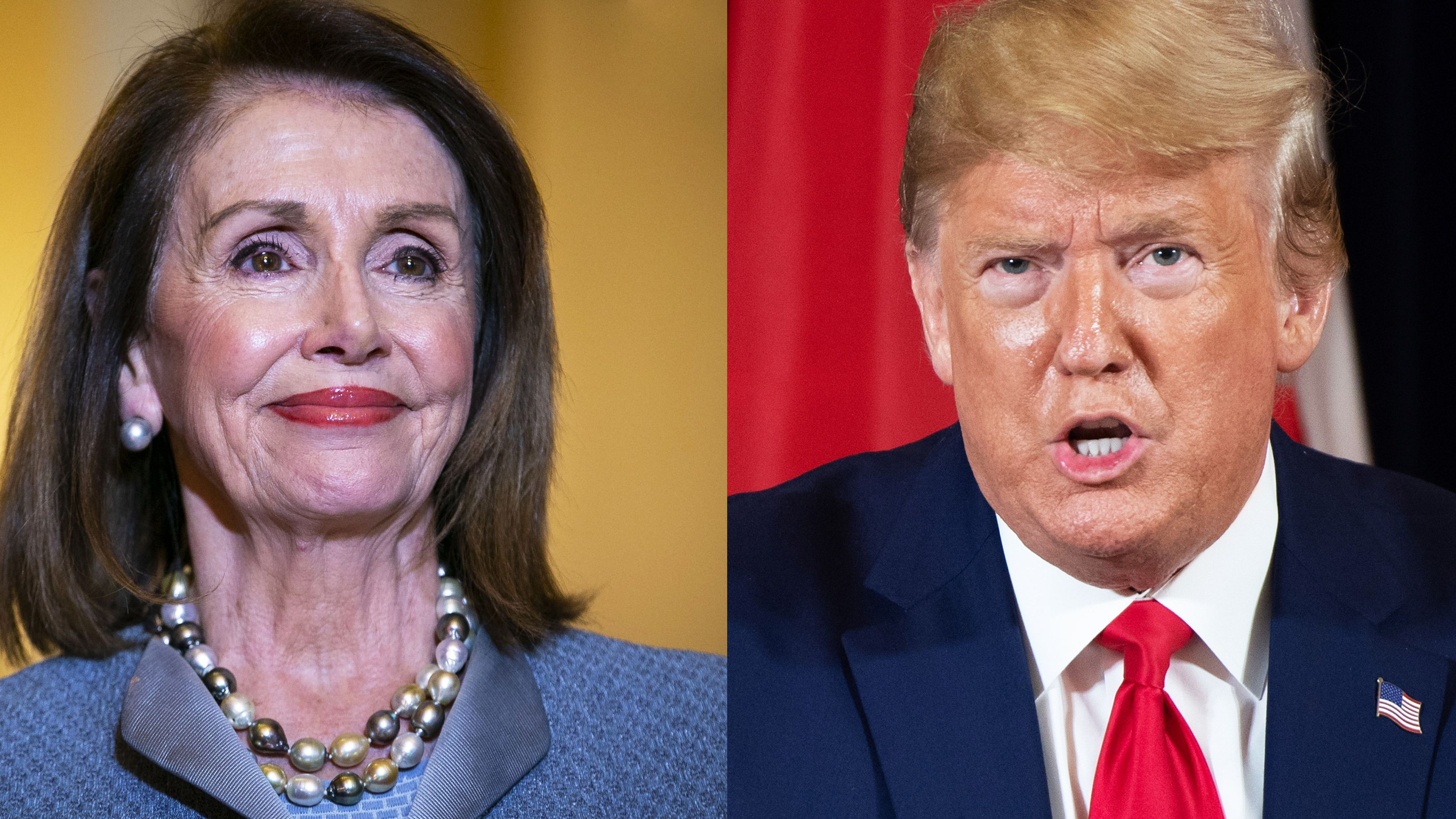Nancy Pelosi Announces Impeachment Inquiry Into Donald Trump
"The actions taken to date by the president have seriously violated the Constitution."


On Tuesday, following months of back-and-forth, Speaker Nancy Pelosi announced that the House of Representatives would hold an impeachment inquiry into President Donald Trump. While the upcoming inquiry alone is a far cry from Trump being removed from office, it's a first step towards it—and Pelosi's announcement is also a deeply symbolic gesture, one intended to make clear that the Democratic Party will no longer sit back and allow the current president to breach the terms of the United States Constitution.
An impeachment inquiry, in short, is an investigation into whether articles of impeachment can be brought against a public official. The House is the only legislative body with the ability to impeach, and the more senior Senate is the only legislative body able to try impeachment proceedings—think of the House as the police, and the Senate as the jury. So, if the House is able to find grounds during the inquiry that Trump committed "high crimes," then the House could seek to impeach, and the process would then move to the Senate. That's when the possibility of Trump being kicked out of office comes into play.
When was the last impeachment inquiry?
Serious impeachment proceedings haven't occurred since the late '90s, when Bill Clinton faced impeachment proceedings over his lies about an affair with Monica Lewinsky (his false statements about the affair were argued to be "lying under oath" and "obstruction of justice"). Clinton was ultimately acquitted and remained in office; before that, Richard Nixon, facing what looked at the time to be probable impeachment, resigned from office in the midst of the Watergate scandal in the mid-70s.

Bill Clinton during impeachment proceedings in 1998.
And before that, the last president to face impeachment proceedings was President Andrew Johnson in 1868, a political drama involving high-level staffing changes that you probably learned about in history class. Like Clinton, Johnson was ultimately acquitted and not impeached and removed from office. So, no U.S. president has actually ever been successfully impeached—but serious constitutional efforts to prove that the current president has committed crimes and must be removed from office have occurred, in total, three times. (Former presidents John Tyler, Ronald Reagan, George W. Bush, and Barack Obama also faced efforts to impeach, but none of those efforts got very far.)
Why does Trump face an impeachment inquiry?
It comes down to whether or not Trump encouraged a foreign power (Ukraine) to formally investigate Joe Biden and his son Hunter Biden on corruption charges. But it's not the first time that Trump has been accused of crimes in office and unconstitutional actions, meaning that an impeachment inquiry could ultimately look into unrelated events and find Trump guilty of impeachment for another reason.
"What Biden did is a disgrace. What his son did is a disgrace," is Trump's position, per his comments to reporters at the United Nations this past week. The president also, however, insists that he did not actively encourage Ukraine to pursue a corruption investigation into the former vice president and his son, and has offered to make public a transcript of the conversation with Ukraine's president, one he describes as "perfect."

Biden in Kiev, Ukraine in 2015.
Long story short: After Ukraine's 2014 revolution, then-VP Joe Biden was dispatched to smooth things over in Ukraine, particularly in terms of weeding out corruption. His son, Hunter, a lawyer and corporate heavyweight, at the time sat on the board of Ukraine's biggest gas company. This, according to Trump, was an enormous conflict of interest, and opened Hunter up to the potential of profiting from the work he father was doing in Ukraine. (Earlier this year, Hunter refused to re-commit to his board seat at the gas company, saying he could already see that it would pose an issue for his father's presidential campaign.)
Get exclusive access to fashion and beauty trends, hot-off-the-press celebrity news, and more.
What happens now?
Pelosi's inquiry is the first stage. If the House finds enough evidence in that inquiry that Trump committed crimes that warrant his being impeached, then the House can formally bring articles of impeachment against Trump. This is akin to an indictment—if the House does this Trump will be "charged" with crimes, or the constitutional variation of it, and then the real drama starts.
At that point, impeachment proceedings move up to the Senate. A "trial" is held, akin to a criminal trial, only the judge is the chief justice of the Supreme Court (John Roberts) and the Senate acts as the jury (basically, it has the deciding vote). Hand-picked lawmakers from the House act as prosecutors, accusing the president of the "high crimes" in detail and laying out evidence for it.
Then the Senate votes. That's the simple part: Two-thirds of the Senate have to find the public official, in this case Trump, guilty. That's the point where he would be removed from office. It's not clear that this situation would ever get to that point, frankly—but for this number of Democrats to support the inquiry alone is a major statement.
For more stories like this, including celebrity news, beauty and fashion advice, savvy political commentary, and fascinating features, sign up for the Marie Claire newsletter.
RELATED STORY


Jenny is the Digital Director at Marie Claire. A graduate of Leeds University, and a native of London, she moved to New York in 2012 to attend the Columbia University Graduate School of Journalism. She was the first intern at Bustle when it launched in 2013 and spent five years building out its news and politics department. In 2018 she joined Marie Claire, where she held the roles of Deputy Digital Editor and Director of Content Strategy before becoming Digital Director. Working closely with Marie Claire's exceptional editorial, audience, commercial, and e-commerce teams, Jenny oversees the brand's digital arm, with an emphasis on driving readership. When she isn't editing or knee-deep in Google Analytics, you can find Jenny writing about television, celebrities, her lifelong hate of umbrellas, or (most likely) her dog, Captain. In her spare time, she writes fiction: her first novel, the thriller EVERYONE WHO CAN FORGIVE ME IS DEAD, was published with Minotaur Books (UK) and Little, Brown (US) in February 2024 and became a USA Today bestseller. She has also written extensively about developmental coordination disorder, or dyspraxia, which she was diagnosed with when she was nine.